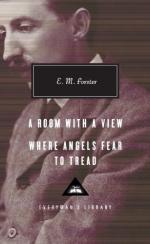Did she intend them to fight? Philip had no intention of doing so; and no more, it seemed, had Gino, who stood nervously in the middle of the room with twitching lips and eyes.
“Please sit down, Signor Carella,” said Philip in Italian. “Mrs. Herriton is rather agitated, but there is no reason we should not be calm. Might I offer you a cigarette? Please sit down.”
He refused the cigarette and the chair, and remained standing in the full glare of the lamp. Philip, not averse to such assistance, got his own face into shadow.
For a long time he was silent. It might impress Gino, and it also gave him time to collect himself. He would not this time fall into the error of blustering, which he had caught so unaccountably from Lilia. He would make his power felt by restraint.
Why, when he looked up to begin, was Gino convulsed with silent laughter? It vanished immediately; but he became nervous, and was even more pompous than he intended.
“Signor Carella, I will be frank with you. I have come to prevent you marrying Mrs. Herriton, because I see you will both be unhappy together. She is English, you are Italian; she is accustomed to one thing, you to another. And—pardon me if I say it—she is rich and you are poor.”
“I am not marrying her because she is rich,” was the sulky reply.
“I never suggested that for a moment,” said Philip courteously. “You are honourable, I am sure; but are you wise? And let me remind you that we want her with us at home. Her little daughter will be motherless, our home will be broken up. If you grant my request you will earn our thanks—and you will not be without a reward for your disappointment.”
“Reward—what reward?” He bent over the back of a chair and looked earnestly at Philip. They were coming to terms pretty quickly. Poor Lilia!
Philip said slowly, “What about a thousand lire?”
His soul went forth into one exclamation, and then he was silent, with gaping lips. Philip would have given double: he had expected a bargain.
“You can have them tonight.”
He found words, and said, “It is too late.”
“But why?”
“Because—” His voice broke. Philip watched his face,—a face without refinement perhaps, but not without expression,—watched it quiver and re-form and dissolve from emotion into emotion. There was avarice at one moment, and insolence, and politeness, and stupidity, and cunning—and let us hope that sometimes there was love. But gradually one emotion dominated, the most unexpected of all; for his chest began to heave and his eyes to wink and his mouth to twitch, and suddenly he stood erect and roared forth his whole being in one tremendous laugh.




